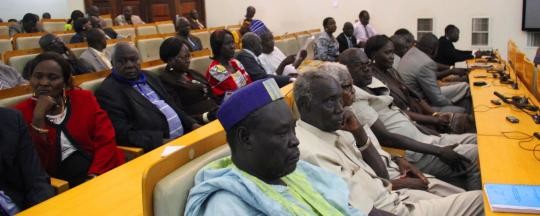South Sudanese members of parliament are set to oppose President Salva Kiir over his controversial National Security Services bill.
Parliamentary minority leader Onyoti Adigo ruled out any possibility of endorsing the bill if there aren’t substantive changes to the legislation.
President Salva Kiir rejected the bill 16 December, 69 days after a disputed vote.
“We heard that the law was returned to Parliament but we did not yet know the paragraphs that have been modified in the law,” Adigo told Radio Tamazuj in Juba.
“The parliament will wait for the law to stand on the amendments made by the Office of the President whether the amendments have been made on the most controversial paragraphs or not,” he added.
Adigo, who leads the opposition SPLM-DC party in parliament, said the bill will be difficult to pass without amendments because the majority of MPs from Equatoria rejected the legislation.
Lawmakers, citizens, and activists heavily criticized the bill because it gives broad powers to National Security agents, including powers of arrest without warrant.
The bill also requires agents to swear a loyalty oath to the president.
‘From the beginning’
Adigo said the entire bill must be reconsidered because it was illegally passed in the first place. “We can talk about it from the beginning,” he vowed, claiming the passage of the law was done incorrectly, illegally and contrary to the rules of parliament to conduct its business.
‘Hundreds’ of MPs walked out of the national assembly to protest the 8 October vote, possibly meaning there was no quorum. The bill was submitted to the president anyway.
Thomas Wani, Chairman of the Parliament’s Information Committee, told Radio Tamazuj that the bill became law in November, per article Aricle 85 of the Interim Constitution of South Sudan which states that any bill passed by parliament becomes law after 30 days if not signed or rejected by the president.
Wani noted that the parliament will not be able to challenge the law until April next year because lawmakers are on leave.
However, Kiir’s spokesperson, Ateny Wek Ateny, has attempted to forge a middle path. Like Wani, he claims the bill passed legally on 8 October, but Ateny claims the bill didn’t reach Kiir’s desk until 21 November. Ateny says the president rejected his own bill on 16 December, before 30 days from 21 November had elapsed.
Related:
Kiir ‘returns’ his own security bill to parliament 69 days after controversial vote (22 Dec.)
Factbox: ‘Quorum’ in South Sudan’s constitution and politics (29 Nov.)
Kiir to try again to pass his security bill (27 Nov.)
Dossier: Reporting on the National Security Service Bill, 2014 (18 Oct.)




